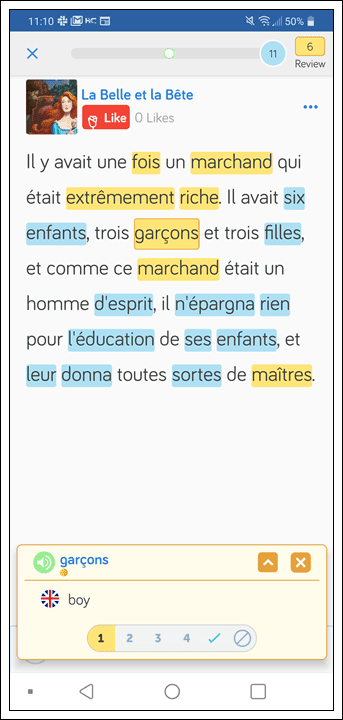Master the French Months of the Year
“En Avril, Ne Te Découvre Pas D’Un Fil.“
Literally translated as, “In April, don’t remove a thread (of clothing).”
Have you heard this popular French proverb?
A possible equivalent in English is the old adage, “April showers bring May flowers,” though in French it’s a reference to how unreliable warm weather is in April, whereas, the English expression is about the odds of getting wet.
Both of these expressions are very much British English terms.
Do you know any equivalents that you’ve heard among American, Canadian or Australian English speakers, for example?
The proverb is often followed by a second rhyme:
“En mai, fais ce qu’il te plaît.”
Literally translated as, “In May, do as you please”.
And then:
“En juin, tu te vêtiras d’un rien.”
Literally translated as, “In June, you’ll be dressed in nothing”.
*or*
“En juin, de trois habits n’en garde qu’un.”
Literally translated as, “In June, keep only one of every three pieces of clothing.”
*or*
“En juin, n’écoute personne.”
Literally translated as, “In June, don’t listen to what anyone says”.

Okay, so, let’s look at a list of the French months:
janvier – January
février – February
mars – March
avril – April
mai – May
juin – June
juillet – July
aout – August
septembre – September
octobre – October
novembre – November
décembre – December
Notice anything? That’s right, there aren’t any capital letters.
Unlike in English, the French words for the months are not capitalized.
Even seasoned French speakers have to revise the ground rules from time to time. For me, problems always seem to crop up with spelling, usually getting vowels mixed up, across my three main languages, French, Spanish and my native language, English. On top of that I have a year or two of experience in Italian and Portuguese, so sometimes this interferes too.
What usually happens, is that I spell a word correctly the first time, but then I go on to doubt myself, and change the spelling a couple of times, making a mess, until I really can’t remember what the correct spelling is anymore!
Thankfully, as a professional translator, I have several well used dictionaries on my desk, and we have infinite resources, like LingQ, at the touch of our fingertips thanks to Google.
To this day, the best tip for learning the months and related vocabulary, is to use a French calendar or diary. And don’t just think about it, putting it at the end of your to do list, like most of us. For starters, pick up your phone right now and switch the operating language to French. If you’re worried you won’t be able to switch it back, just note down how to access the language settings somewhere, come on, whats the worst that can happen?!

You can purchase a French diary or calendar cheaply online, and once you’ve used it, maybe keep a hold of it to flick through for revision in the future.
A few more key words:
Un mois – a month
Le mois – the month
Les mois – the months
L’an *or* l’année – the year
Une décennie – a decade
La décennie – decade
Les décennies – decades
Un siècle – a century
Le siècle – the century
Les siècles – the centuries
In French, the months are all masculine. So that’s two things to keep in mind, the months are all masculine, and there are no capital letters.
So how do I say, “in May”, for example?
It’s simple. We just need to use “en” for “in”, plus the month itself.
“en mai.”
With dates, the ordinal numbers are not used, except for the first of the month. So we can say, “le premier mai” but it would be “le deux juin”, not “le deuxième juin”, ordinal numbers like deuxième, don’t work, unless it’s for the first of the month.
Le premier/ le 1er
The first
Il y a douze mois dans l’année.
There are twelve months in a year.
Je suis né le 3 novembre.
I was born on the 3rd of November.
French Holidays
Some people learn best by associating an interesting or unusual piece of information with the word they’re trying to learn. Learning a fact like this can help consolidate the word in your long term memory.
For the French months, you could take some time to learn about the French holidays celebrated each month.
Le 1er *or* premier janvier is Le Jour de l’An.
What we call in English, New Year’s Day.

Le 2 février is la Chandeleur (crêpes!). No English equivalent for this one, I’m afraid, but I’m sure you won’t forget about the pancakes!
Le 1er mai is La Fête du Travail, Labor Day.
Le 8 mai is the Fête de la Victoire, Truman Day, in Missouri.
Le 14 juillet is La Fête Nationale, Bastille Day.
Le 1er novembre is La Toussaint, All Saints’ Day.
Le 11 novembre is Le Jour d’Armistice, Veterans Day.
Le 25 décembre is Noël, Christmas.
Le 31 décembre is known as, Saint Sylvestre *or* Le Réveillon, our New Year’s Eve.
Note the format for saying a date in French is the following: Le 2 janvier.
We put “le” before the number, and then the month, with a lowercase letter.
Have you tried saying when your birthday is in French yet? Give it a try!
Mon anniversaire est ____.
Mon anniversaire est le 26 octobre.
My birthday is on the 26th of October.
How about Christmas?
Noël est le 25 décembre.f
Christmas is on the 25th of December.
Remember, *everyone*, no matter how experienced they are with the French language, has letters or months that always trip them up! Keep at it. You’ll get there.
Learn French Faster Using LingQ
Immersing yourself in French doesn’t require you to travel abroad or sign up for an expensive language program.
However, it can be a bit tiresome to find interesting content, go back and forth between sites, use different dictionaries to look up words, and so on.
That’s why there’s LingQ, the best way to learn French online because it lets you learn from content you enjoy!

You can import videos, podcasts, and much more and turn them into interactive lessons.
Keep all your favourite French content stored in one place, easily look up new words, save vocabulary, and review. Check out our guide to importing content into LingQ for more information.
LingQ is available for desktop as well as Android and iOS. Gain access to thousands of hours of audio and transcripts and begin your journey to fluency today.
***
Ella Louise Finn is a Freelance French & Spanish to Native English Translator, Proofreader, Copywriter and Transcriber, now based in Glasgow, Scotland, after spending time in Argentina and France honing her language skills.


